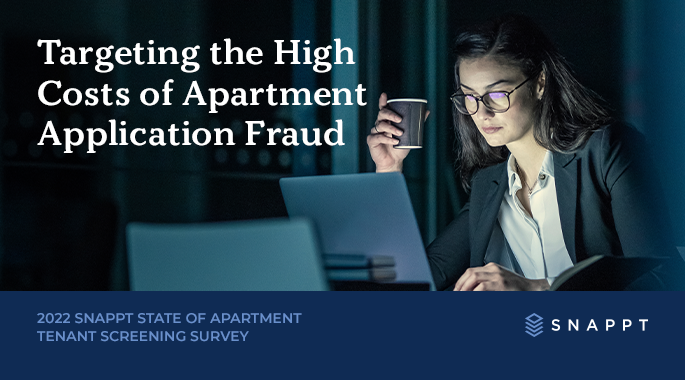Findings from the Snappt 2022 State of Apartment Tenant Screening Survey

When it comes to managing apartments in the current environment, MDU property professionals have had their hands full. During the COVID-19 crisis, fraud has risen, government- mandated eviction moratoriums have squeezed landlords, and now – as we exit the pandemic – rents are rising.
While higher rents may seem like a positive, it also means operators are taking on more risk with every lease they approve. If they get it wrong and let fraudsters through the door, more money is on the line when tey can’t collect, driving the cost of preventable evictions even higher.
Against that backdrop, survey respondents ranked their biggest challenges running properties today. Perhaps unsurprisingly, the roots of all of them could be traced back to issues that should have been flagged during the application screening process.
At the top of their list were tenants who pay rent late. Nearly three-quarters (73%) of respondents said getting the rent late was somewhat to extremely common, while another two-thirds (66%) said discovering damage to units after tenants left fell into the same category.
Why is this happening now?
Since property managers see this behavior daily, we wanted to ask them what is driving these trends. Here’s what they said:
- Five out of six of them (85%) said it was due to the increasing prevalence of fraud in our society.
- 85% said the ease with which false documents can be obtained online by apartment applicants today.
- 78% cited the rise in rents – and the pressure it puts on prospects to “stretch” on their applications.
- Three fourths (75%) pointed to eviction moratoriums being somewhat or extremely significant as contributing factors.
- 70% said the COVID-19 pandemic was a significant driver.
- Two thirds (66%) ranked less in-person contact with applicants – the growing sense of anonymity in society – in the same way.
The Rise of the Fraud Economy
While those numbers may seem shocking at face value, they’re in line with broader fraud and document manipulation trends in the culture today.
Fraud was already burgeoning pre-COVID-19. But since the pandemic, it has mushroomed, costing businesses 5.4 trillion globally, more than twice the gross domestic product of the UK. Global consultancy Crowe has called fraud “the last great unreduced business cost.”
In the U.S., reports of fraud, identity theft and other deceptions spiked by 67% between 2019 and 2021, according to the Federal Trade Commission. The grifts range from cyber and payment fraud to lying on bank loan applications, and more recently, supply chain and ESG reporting fraud, according to PwC.
For example, Lexis Nexis found over 30,000 fraud rings engaged in forgery, filing false claims, identity theft, identity manipulation and fake bank checks. Many groups comprised family members or circles of friends who collaborated to improve their collective fraud success rates.
At the same time, a cottage industry has sprung up online to help consumers buy fabricated documents, including bogus paystubs and bank statements, to fraudulently qualify for loans, mortgages, car purchases and apartment leases, among other transactions.
The Rise of Fraud Meets Rising Rents
In the apartment industry, these developments have coincided with record rent increases. For some tenants who need housing, the increased prevalence and acceptance of engaging in fraudulent behavior may be all the justification they need to submit a falsified application. This is the double-edged sword of rising rents for property managers, where communities can net more income, but only at the price of having to police more applications for fraud.
“Some of it can be attributed to the soaring costs of housing, especially in the last year, where rents have risen anywhere between 15% to 30%,” one regional manager of more than 10,000 units told us. “We know people did not receive 15% to 30% increases in pay. So, to be able to still afford three times the monthly rent to qualify for an apartment is challenging.”